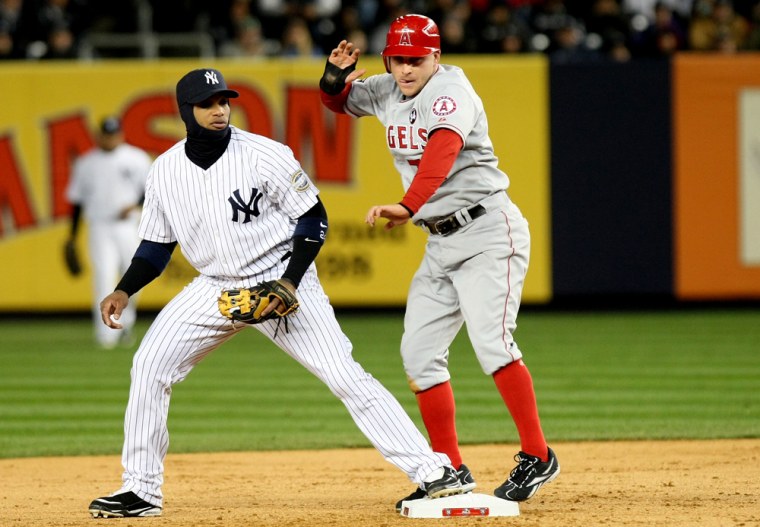With as many as four World Series games scheduled in November, Major League Baseball and FOX could take a financial hit if northeastern skies drop a deep chill or some white stuff on New York or Philadelphia.
As Neal Pilson, a former CBS Sports executive, likes to say: TV detests weather delays. Ratings suffer. Sponsors stew. Revenues recede.
“That’s extremely disruptive,” says Pilson, now a sports-media consultant and president of Pilson Communications. “I remember when we had the earthquake World Series in 1989 and we lost 11 days. That’s impossible from a network point of view. You need continuity. You want the games to play on the dates you’ve scheduled them.
“At some point, we’ll all recognize that the quality of the games could be impacted by adverse weather late (in the year),” Pilson added. “There’s going to be serious discussion about backing (the World Series) up, perhaps by a week or so.”
The seventh game of the 1968 World Series fell on Oct. 10. In 1986, the Mets took Game 7 from Boston on Oct. 27. In 2010, the preliminary schedule has a potential Game 7 slotted for Nov. 4. How did the Fall Classic become the November Numb? Cold, hard dollars.
In 1995, an extra Divisional Playoff Series was added to accommodate “wildcard” teams, boosting gate and TV revenues. In 2007, MLB began stuffing four extra off days into its post-season calendars to ensure a Wednesday World Series opener – and to avoid playing Game 1 on a Saturday, traditionally the weakest night for TV viewers. Under that setup, World Series games 5, 6 and 7 would be aired on weeknights as well, thus drawing the league fatter TV rights fees and higher advertising rates.
Team owners, meanwhile, have balked at shortening the 162-game regular season, complaining such a move would strip them of lucrative home dates. So it has come to this: During the just-concluded American League Championship Series, fans watched the New York Yankees’ Robinson Cano hack at pitches while cloaked in a black ski mask. California Angels Manager Mike Scioscia saw that Nordic scene from the dugout and said later: “It has an impact on the quality of play. And I think that’s very, very important to the integrity of our game.”
Measuring the monetary value off the game’s integrity is tricky. (Steroid use among many stars, for example, didn’t seem to dampen attendance). But if players are so bundled for warmth they lose quickness in the field or bat speed at the plate, viewing fans may be turned off or might even tune out, experts say.
“Could you have the quality of the game not be what is was because you’re playing in 32 degrees? Sure,” said Vince Gennaro, a consultant to several Major League Baseball teams and author of “Diamond Dollars: the Economics of Winning in Baseball.” “I don’t think this a great regular practice.”
Even if rain or snow doesn’t stall the 2009 World Series, “the fear and expectation of bad weather could cause people to stop and say, ‘We’re just flirting with trouble here,’ ” Gennaro said.
Through the first two rounds of baseball’s post season, however, business has been piping hot. FOX’s broadcast of the six-game Angels-Yankees showdown yanked in 35 percent more viewers than the network’s coverage of the 2008 National League Championship Series. On Sunday night alone, FOX outdrew NBC’s “Sunday Night Football.” Overall, MLB’s 2009 post-season TV numbers are running 15 percent higher than the Nielsen ratings earned by the same games last year.
But entering the final week of October and the first week of November, the TV sports landscape gets a bit stiffer. World Series Games 1 and 2 on FOX will go head-to-head against nationally broadcast NBA games featuring marquis teams like New Orleans, San Antonio, Denver and Portland. World Series Game 3, scheduled for Saturday Oct. 31, will vie for prime-time viewers with college football games pitting eleven of the Top-25 teams, including No. 3 Texas, No. 5 USC, No. 9 LSU and No. 10 Oregon. And if the World Series reaches a fifth game, it will be air at the same time that the NFL’s Atlanta Falcons clash with the undefeated New Orleans Saints on Monday night Nov. 2.
“With all respect to the NBA, I don’t believe NBA early season games are a factor when you’re talking about the World Series,” Pilson said. “The issue for baseball is really trying to avoid NFL competition.”
As an event commodity, an early November World Series is no tougher sell to advertisers than a late-October baseball finale, Pilson and Gennaro both say. The weather is the real wildcard. And the risk of a snowy setback only rises as each day is crossed off the calendar.
“Next year, you could have, say, a Denver-Minneapolis outdoor, early-November World Series,” Pilson said. “You may be looking at severe weather dislocations.”
So Pilson offers a suggestion to club owners and league brass: play six Saturday, day-night doubleheaders during the spring and summer, compressing the regular season by a week. “That would keep the revenue base in tact plus, playing on Saturdays, travel would not be an issue,” he said. “You would need player’s association approval to do that. But I believe that would be the least painful way to get us back to what we perceive as a normal configuration of baseball’s post season.”
